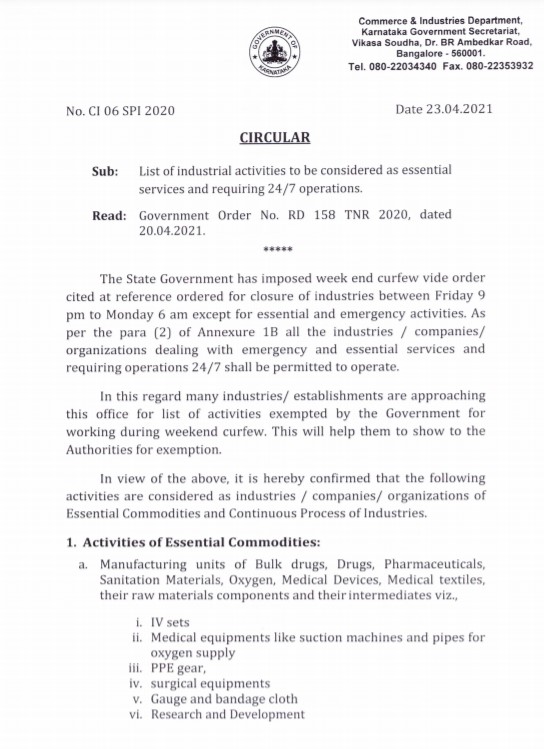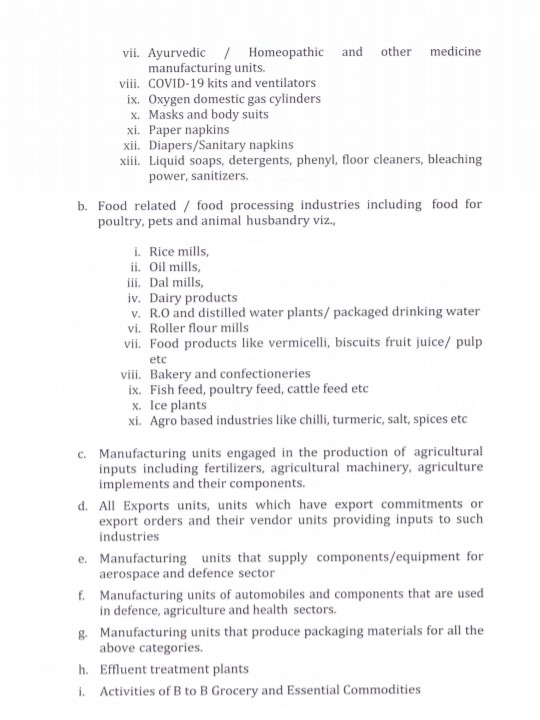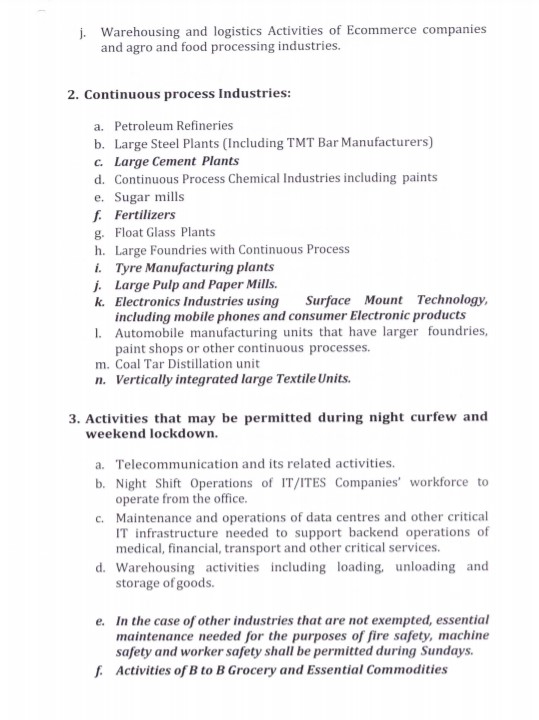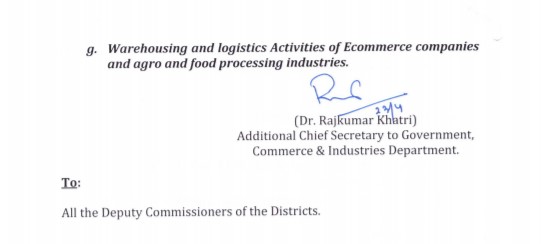Among exempted industries are medicine and medical item units, food units, agro and export units, continuous process units, telecom and IT
BENGALURU:
Forced to backtrack on some of its stringent curbs following an outcry from citizens and trade bodies, the Karnataka government has issued a list of essential services which are exempted from the weekend curfews and all other days till May 4.
Additional Chief Secretary Rajkumar Khatri (Commerce & Industries Department), by an order dated April 23, has issued a list of industrial activities that are considered essential services requiring 24/7 operations.
The state government had imposed a weekend curfew vide its order of April 20 and ordered closure of a large number of industries between 9 pm on Friday and 6 am on Monday, except for essential and emergency activities.
The exemptions are:
- Activities for essential commodities:
a. Manufacturing units of bulk drugs, drugs, pharmaceuticals, sanitation materials, oxygen, medical devices, medical textiles, their raw material components and intermediates, viz.:
i. IV sets
ii. Medical equipment like suction machines and pipes for oxygen supply
iii. PPE gear
iv. surgical equipment
v. Gauze and bandage cloth
vi. Research and Development
vii. Ayurvedic/homoeopathic and other medicine manufacturing units
viii. Covid-19 kits and ventilators
ix. Oxygen domestic gas cylinders
x. Masks and body suits
xi. Paper napkins
xii. Diapers/sanitary napkins
xiii. Liquid soaps, detergents, phenyl, floor cleaners, bleaching power, sanitizers.
b. Food related/food processing industries including food for poultry, pets and animal husbandry, viz:
i. Rice mills
ii. Oil mills
iii. Dal mills
iv. Dairy products
v. R.0. and distilled water plants/ packaged drinking water
vi. Roller flour mills
vii. Food products like vermicelli, biscuits, fruit juice/pulp, etc.
viii. Bakery and confectioneries
ix. Fish feed, poultry feed, cattle feed, etc.
x. Ice plants
xi. Agro-based industries like chilli, turmeric, salt, spices, etc.
c. Manufacturing units engaged in the production of agricultural inputs including fertilizers, agricultural machinery, agriculture implements and their components
d. All export units, units which have export commitments or export orders and their vendor units providing inputs to such industries
e. Manufacturing units that supply components/equipment for aerospace and defence sectors
f. Manufacturing units of automobiles and components that are used in defence, agriculture and health sectors
g. Manufacturing units that produce packaging materials for all the above categories
h. Effluent treatment plants
i. Activities of B2B grocery and essential commodities
j. Warehousing and logistics activities of e-commerce companies and agro and food-processing Industries.
- Continuous process industries:
a. Petroleum refineries
b. Large steel plants (Including TMT bar manufacturers)
c. Large cement plants
d. Continuous process chemical industries, including paints
e. Sugar mills
f. Fertilizers
g. Float glass plants
h. Large foundries with continuous process
i. Tyre manufacturing plants
j. Large pulp and paper mills
k. Electronics industries using surface mount technology, including mobile phones and consumer electronic products
l. Automobile manufacturing units that have larger foundries, paint shops or other continuous processes.
m. Coal tar distillation unit
n. Vertically integrated large textile units.
- Activities that may be permitted during night curfew and weekend lockdown
a. Telecommunication and its related activities
b. Night shift operations of IT/ITeS companies’ workforce to operate from the office
c. Maintenance and operations of data centres and other critical IT infrastructure needed to support backend operations of medical, financial, transport and other critical services
d. Warehousing activities, including loading, unloading and storage of goods
e. In the case of other industries that are not exempted, essential maintenance needed for the purposes of fire safety, machine safety and worker salety shall be permitted during Sundays
f. Activities of B2B grocery and essential commodities
g. Warehousing and logistics activities of e-commerce companies and agro and food processing Industries





